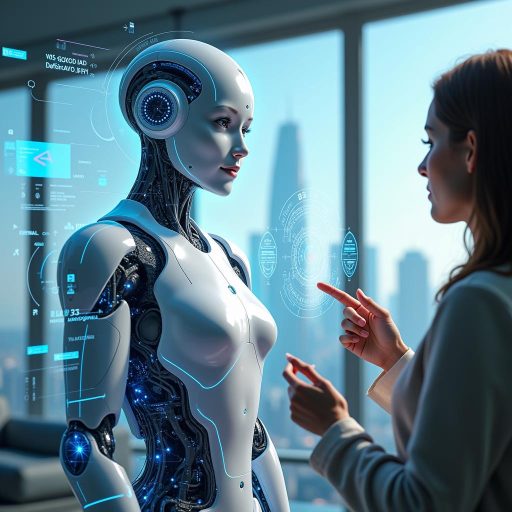Imagine having an AI assistant so intuitive and powerful that it feels like an extension of your own mind, anticipating your needs before you even articulate them. This isn’t science fiction anymore, it’s the bold new vision Mark Zuckerberg has laid out for Meta’s AI future, centered on what he calls “personal superintelligence.”
In a series of recent announcements, Meta’s CEO has charted an ambitious course that could fundamentally transform how we interact with AI and, potentially, reshape the competitive landscape of the tech industry. Let’s explore what this means and why it matters.
The Personal Superintelligence Vision
At its core, Meta’s vision revolves around creating AI assistants that transcend current capabilities to become what Zuckerberg describes as “personal superintelligence.” But what exactly does that mean?
Zuckerberg envisions AI systems that serve as deeply personalized assistants with capabilities far beyond today’s chatbots and virtual assistants. These wouldn’t just answer questions or perform tasks on command, but would understand your preferences, habits, and needs at such a profound level that they could augment your own cognitive abilities.
“We’re working toward a future where everyone has a superintelligent AI assistant,” Zuckerberg explained in his latest announcement. “These systems will transform how we work, learn, connect, and navigate daily life.” 1
This represents a significant evolution from Meta’s previous AI strategy. Rather than focusing exclusively on general artificial general intelligence (AGI), Meta is emphasizing how advanced AI can be harnessed to create deeply personal and individualized experiences.
Building the Infrastructure
Realizing this vision requires massive investments in both talent and technology. Meta isn’t just making promises, it’s backing them with substantial resources.
The Superintelligence Team
In mid-2025, Zuckerberg established a dedicated “Superintelligence” AI group within Meta, recruiting top AI researchers and engineers. 3 This elite team operates somewhat independently from Meta’s other AI initiatives and reports directly to Zuckerberg himself, underscoring the strategic importance of this effort.
Sources indicate that Meta has been aggressively recruiting AI talent, with compensation packages reportedly reaching into the millions for leading researchers. This talent acquisition strategy mirrors Meta’s approach during the early days of its Oculus VR division, when the company was determined to establish leadership in an emerging technology.
Computational Firepower
On the hardware front, Meta has significantly expanded its AI compute infrastructure. Recent analysis from SemiAnalysis indicates that Meta has committed to purchasing over 350,000 H100 GPUs from NVIDIA, representing one of the largest AI compute investments in the industry. 5
This computational firepower is essential for training the increasingly large language models that will power Meta’s personal superintelligence vision. Internal documents suggest Meta is working on models that dwarf its current Llama series in both parameter count and capabilities.
The Data Advantage
Perhaps Meta’s most significant advantage is its access to vast amounts of user data across its family of apps, including Facebook, Instagram, WhatsApp, and its AR/VR platforms. This data provides crucial training material for creating personalized AI experiences.
“The combination of our social graph data and multimodal content gives us unique capabilities to build truly personalized AI,” Zuckerberg noted. “This isn’t just about bigger models, it’s about creating AI that understands human social contexts and personal preferences at a deeper level.” 2
From Vision to Reality
While the vision is compelling, translating it into reality poses significant challenges. Meta’s approach appears to be methodical, with several key elements:
Integration Across Platforms
Meta plans to deploy increasingly sophisticated AI assistants across all its platforms, from text-based interactions in Messenger and WhatsApp to multimodal experiences in its AR glasses and VR headsets. The company believes these various touchpoints will create a cohesive ecosystem where your personal AI assistant can follow you seamlessly throughout your digital life.
Progressive Enhancement
Rather than waiting for a single breakthrough moment, Meta is adopting an iterative approach, steadily enhancing the capabilities of its AI assistants over time. We’re already seeing early versions of this strategy with Meta AI’s integration across its platforms.
“We’ll continue rolling out new capabilities every few months,” Zuckerberg promised. “Each update will make these systems more helpful, more personalized, and more intuitive.” 4
The Competitive Landscape
Meta’s bold vision positions it in direct competition with other tech giants pursuing advanced AI. While OpenAI, Google, and Anthropic have focused heavily on general AI capabilities, Meta’s emphasis on deeply personalized AI represents a potentially differentiated approach.
The strategy also aligns with Meta’s core strength in social networking. By focusing on personal superintelligence rather than general AI systems, Meta can leverage its vast social graph and user data in ways that competitors may struggle to match.
Industry analysts have noted that this approach could help Meta address one of its persistent challenges: creating new, compelling reasons for users to remain engaged with its platforms amid increasing competition for attention.
Ethical Considerations and Challenges
The vision of personal superintelligence raises important questions about privacy, security, and the potential for algorithmic influence on human decision-making.
Meta acknowledges these concerns and claims to be building safeguards into its systems from the ground up. “We recognize the responsibility that comes with developing these technologies,” Zuckerberg stated. “That’s why we’re investing heavily in safety research and building transparent systems.” 1
However, critics remain skeptical, pointing to Meta’s track record on privacy and questioning whether the company can be trusted with AI systems that would have unprecedented insight into users’ lives and decision-making processes.
What This Means For You
If Meta’s vision materializes, users could gain access to AI assistants that understand their preferences, habits, and needs at a level current systems can only dream of. These assistants could help with everything from professional tasks to personal relationships, serving as cognitive partners rather than mere tools.
The potential applications span virtually every aspect of digital life, from content creation and curation to personal productivity, health management, and educational support. For professionals, these tools could dramatically enhance creative and analytical capabilities.
Yet users will face important decisions about how much of their personal data they’re willing to share in exchange for these capabilities, and how much influence they want AI systems to have over their daily lives.
The development of personal superintelligence also raises profound questions about human agency, identity, and the boundaries between human and machine intelligence, issues we’ll all need to grapple with as these technologies evolve.
As we stand at this technological crossroads, I’m curious: What role would you want a personal superintelligent AI to play in your life? Would you embrace an AI that knows you deeply enough to anticipate your needs, or does that prospect make you uneasy? Share your thoughts in the comments below, as we collectively navigate this rapidly approaching future.
Footnotes
1 Artificial Intelligence News: Zuckerberg outlines Meta AI vision for personal superintelligence
2 TechJack Solutions: Zuckerberg outlines Meta’s AI vision for personal superintelligence
3 Bloomberg: Zuckerberg Recruits New Superintelligence AI Group at Meta
4 LinkedIn: Sharif Zafar’s post on Zuckerberg’s AI vision
5 SemiAnalysis: Meta Superintelligence: Leadership, Compute, Talent, and Data


